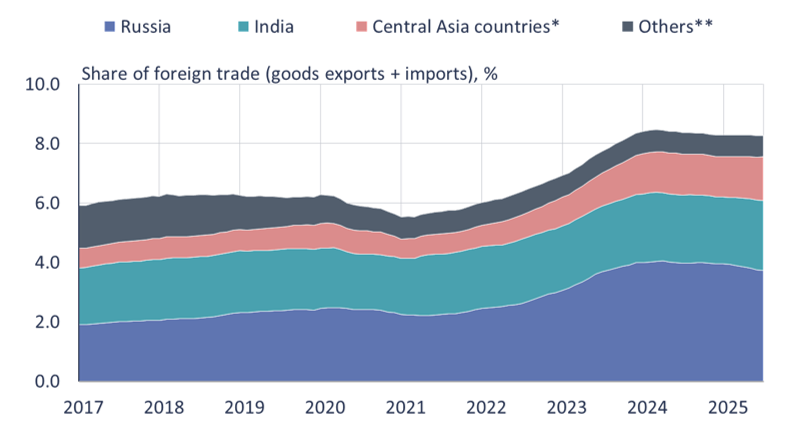BOFIT Weekly Review 36/2025
SCO summit announcements include construction of a new Russia-China gas pipeline and establishing a new development bank
This year’s 25th Shanghai Cooperation Organisation (SCO) summit, held in Tianjin, China (Aug. 31–Sept. 1), was hosted by Chinese president Xi Jinping, and included the presence of Russian president Vladimir Putin and Indian prime minister Narendra Modi. Other SCO members (Belarus, Iran, Kazakhstan, Kyrgyzstan, Pakistan, Tajikistan and Uzbekistan) were also represented. The SCO currently also has two observer states (Afghanistan and Mongolia) and 15 dialogue partner countries.
The SCO, which aims to promote cooperation, trust, security, and antiterrorism efforts between the member states, has relatively few actual operations. Its member states also have conflicting political and economic interests. In his opening address, President Xi envisioned broadening the scope of the organization by establishing platforms for cooperation in energy, green industry, and the digital economy. He also promised to increase lending and grants to SCO member states for development projects and education. Xi welcomed all SCO countries to use its Beidou Navigation Satellite System and cooperation in the International Lunar Research Station project.
Summit participants jointly approved China’s proposed establishment of a new development bank within the SCO framework. The development bank would support security and economic cooperation among member countries and finance infrastructure projects. Most SCO member countries already participate in the China-led Asian Infrastructure Investment Bank (AIIB) or the New Development Bank established by the BRICS bloc. Both development banks are relatively small.
The biggest economic news was the announcement by Russian gas giant Gazprom of a binding memorandum of understanding with China on construction of the long-discussed Power of Siberia 2 gas pipeline. The roughly 2,600 km pipeline would transmit gas to China via Mongolia from Arctic Yamal gas fields on Russia’s European side and fields of western Siberia. The total capacity of the pipeline would be about 50 billion cubic metres (bcm) a year, which corresponds to about a third of the volume of Russia pipeline gas exports to Europe prior to the 2022 invasion of Ukraine. No supply contract yet exists, however, and no construction schedule has yet been announced. The proposed agreement is not particularly advantageous for Gazprom as it would very likely provide gas at a significant discount. Moreover, China has not committed to provide funding for the construction. Gazprom noted that the pricing terms would be settled later. Gazprom also said it would increase the amount of gas transmitted to China via existing pipelines, mainly Power of Siberia 1, by 8 bcm a year to a total of 56 bcm a year.
China did not confirm the memorandum, and only broadly noted that China and Russia had signed over 20 bilateral cooperation agreements in such areas as energy, aerospace, artificial intelligence, agriculture and education. China also said it would grant Russian tourists visa-free travel on a trial basis valid for one year from September 15.
The contributions of SCO countries to Chinese goods trade are fairly modest

Sources: China Customs, CEIC and BOFIT. * Kazakhstan, Kyrgyzstan, Tajikistan and Uzbekistan. **Iran, Pakistan and Belarus.